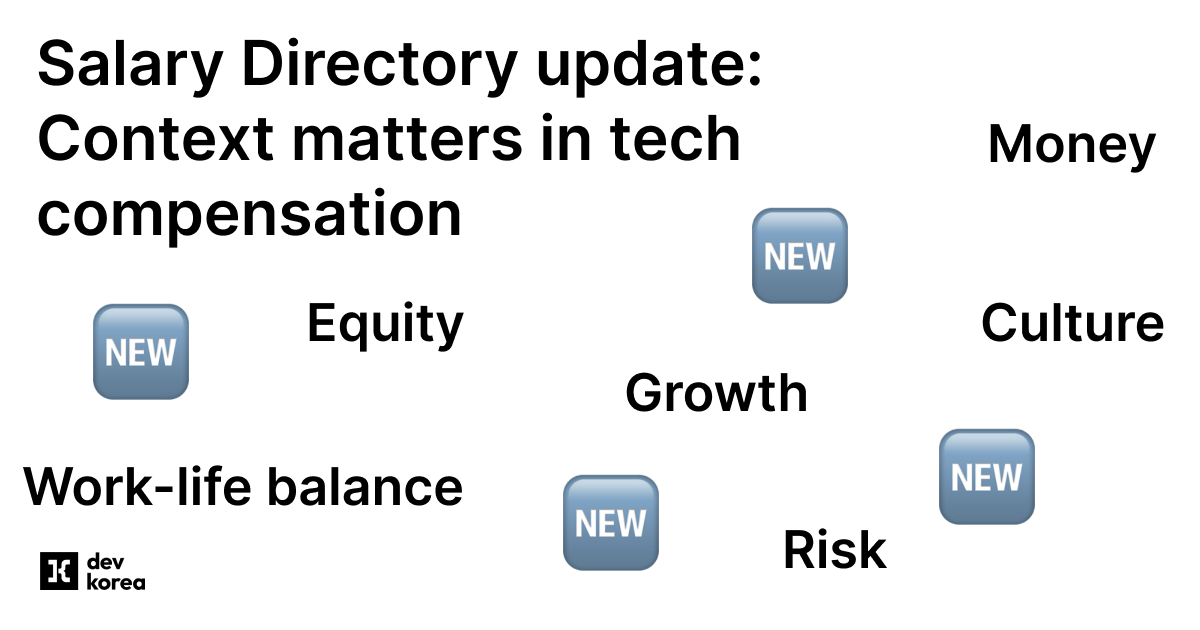
Salary Directory update: Context matters in tech compensation
이 글은 한국어로도 제공됩니다.한국어로 읽기 →
When we launched Dev Korea's Salary Directory, our mission was simple: bring transparency to Korea's tech salary landscape. We wanted to help professionals negotiate fairly and give companies benchmarks for competitive compensation. What we didn't anticipate was how a single number could be taken out of context—and potentially harm the very startups we aim to support.
The wake-up call
Recently, a startup founder reached out with a concern that made us rethink our approach. A candidate had pointed to our salary data during negotiations, essentially saying "I want this amount because it's written on Dev Korea." The problem? Our directory showed one big average combining all salaries—from 10-person startups to 10,000-person corporations. This single number wasn't representative of any specific company type, yet it was being used as a definitive benchmark.
This wasn't what we intended. Our goal has always been to create a fair, informed marketplace—not to create unrealistic expectations that could hurt either job seekers or employers.
The reality of tech compensation in Korea
Here's what many don't realize: A "Software Engineer" salary can vary by 300% or more depending on the company context.
A developer at a major tech corporation might earn ₩80-120M, while someone with the same title and experience at a 10-person startup might earn ₩40-60M. Both are fair within their contexts. The difference isn't about the developer's worth—it's about:
- Company resources: A Series A startup has different constraints than a public company
- Compensation structure: Startups might offer equity that could be worth multiples of salary difference
- Risk vs. stability: Higher salaries at corporations often reflect lower risk
- Growth opportunities: Smaller companies may offer faster career progression
- Work scope: You might be employee #5 building core products vs. employee #5,000 maintaining legacy systems
What we've changed
To provide more realistic and useful salary data, we've restructured the Salary Directory with three categories based on company size. While we recognize there are many variables that affect compensation and this may not be the perfect solution, we believe it's a significant improvement over a single average that combines all company types:
🏪 Small companies (1-250 employees)
These include startups, scale-ups, and smaller tech firms. Expect more equity, broader responsibilities, and higher growth potential—but typically lower base salaries.
🏢 Medium companies (251-1,000 employees)
Established companies with stable revenue but still maintaining some startup agility. Usually offer balanced compensation packages.
🏭 Large companies (1,001+ employees)
Major corporations, chaebols, and global tech giants. Higher base salaries, comprehensive benefits, but potentially slower career progression.
How to use the data responsibly
For job seekers:
- Look at data within your target company category
- Consider total compensation, not just base salary
- Factor in non-monetary benefits (visa sponsorship, learning opportunities, work-life balance)
- Use the data as a starting point for research, not an absolute demand
For employers:
- Be transparent about what compensation package you can offer
- Explain how equity or other benefits complement base salary
- Use category-appropriate benchmarks when setting salary ranges
- Remember: underpaying relative to your category will limit your talent pool
Important caveats we now highlight
-
Total compensation varies: Our figures include base salary, bonuses, stock options, and benefits—but not every company offers all components
-
Multiple factors affect salary: Skills, negotiation, timing, company funding, team size, and even specific hiring manager budgets all play a role
-
Salary isn't everything: Work-life balance, learning opportunities, company culture, and growth potential matter too
-
Sample size matters: Some categories have limited data points. Use this as one input among many in your research
Building a healthier tech ecosystem
Salary transparency remains crucial for a fair job market. But context is equally important. By categorizing salaries by company size, we hope to:
- Help candidates set realistic expectations
- Enable startups to compete for talent within their means
- Reduce frustration on both sides of the hiring process
- Create more successful, sustainable employment matches
Moving forward together
We're committed to refining this tool based on community feedback. Your input matters: Have suggestions for improving the Salary Directory? Encountered issues we should address? Let us know.
Keep contributing
The more data we collect, the more accurate and helpful our insights become. If you haven't already, please share your salary anonymously. Every contribution helps build a more transparent, fair tech job market in Korea.
Remember: Good data + proper context = better decisions for everyone.
Ready to explore your next move? Visit Dev Korea to check the latest job openings, or if you’re an employer, post a job and connect with our vibrant community of tech talent eager to contribute to Korea’s innovation ecosystem.